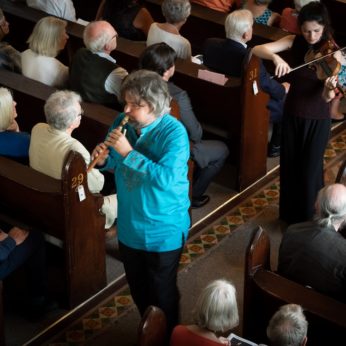Composer: Pierre Thilloy (b. 1970)
Performance date: 04/07/2019
Venue: St. Brendan’s Church
Composition Year: 2014
Duration: 00:32:52
Recording Engineer: Gar Duffy, RTÉ
Instrumentation Category:Sextet
Instrumentation Other: vn, cl, 2vn, va, vc
Artists:
Mairead Hickey -
[violin]
Mate Bekavac -
[clarinet]
Dahlkvist Quartet (Alexander Kagan [violin], Kersti Gräntz [violin], Jon Dahlkvist [viola], Hanna Dahlkvist [cello]) -
[quartet]

Mate Bekavac [duduk], Mairéad Hickey [violin]
Dahlkvist Quartet
Alexander Kagan, Kersti Gräntz [violins], Jon Dahlkvist [viola], Hanna Dahlkvist [cello]
Pierre Thilloy [born 1970]
Khojaly 613 Op.197/2 [2014]
À la memoire des victimes de Khojaly en voeux de respect et de paix
1. Largo funèbre
2. Moderato quasi allegro
3. Epitaphe – Largo doloroso, quasi ‘hor temps’
This work was written to commemorate the lives of the 613 Azerbaijani civilians killed on 26 February 1992 in the Azerbaijani town of Khojaly in Nagorno-Karabakh occupied by Armenian forces supported by the 366th Regiment of the Soviet Army.
The Khojaly Massacre ranks amongst one of the most vivid and nightmarish visions in the collective memory of the Azerbaijani people, stemming from the dark, insidious Nagorno-Karabakh conflict that continues to harm an entire people. There is a mechanism, commonly called ‘memory’, which, far from providing vulgar pathos, is a bulwark against oblivion, and operates as a timeless sentinel of dignity. ‘Memory’ has always been a creative banner for composers and artists, who, beyond any political or revolutionary context, are able to remind others of milestones, troubled moments, and dramas, which touch the very depths of their soul.
I wrote this piece to pay homage to every one of the men and women who were lost on that terrible night, having suffered such mental and physical pain; to the people who lost everything, even hope, endeavouring, through this act of remembrance, to bring them peace.
This terrifying event has affected me since my first visit to Azerbaijan in July 2001, when by some inexplicable process, I felt the suffering of the victims enter me, sensed an aura of tragedy that words cannot express. Since then, I have been writing this piece incessantly, to find peace. So that we do not forget them, so that we never forget them.
Pierre Thilloy
A note on the duduk
Mate Bekovac will play the duduk instead of the clarinet in this performance. The Armenian duduk is arguably one of the most powerful of all instruments in its ability to move someone in their very core. It is a double-reeded wind instrument which can be traced back to 1200 BC, with Armenian duduk music cultivated from the first century BC during the reign of Armenian Emperor, Tigran the Great.
Copyright © 2025 West Cork Music. All rights reserved.
Designed and developed by Matrix Internet